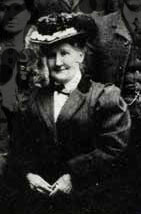
Origins and career
She was born Elizabeth Anne Milne in 1858 in Sweden, but educated largely in England. In 1880, she married English–born engineer Richard Gard’ner. The couple travelled to Australia and then New Zealand, where Richard became involved in railway projects.
When Richard’s health deteriorated, Mrs Gard’ner stepped up to be the family breadwinner. In 1895 she became the superintendent of the School of Domestic Instruction. It was initiated when the Canterbury Women’s Institute proposed that the teaching of domestic science would enable women and girls to thoroughly prepare their daughters or themselves for household duties as mistresses or maids.
Her husband died in 1898.
The School of Domestic Instruction
The school was a pioneering organisation in the field of home economics teaching. It began in a warehouse in Lichfield street then moved to Hobb's Building in Cathedral Square and finally into a new building on the corner of Manchester and Worcester Streets. It struggled financially in its early years, and was criticised by many. However with the unwavering support of its managing committee (whose membership included Kate Baldwin) and with the skilled and capable management of Mrs Gard’ner, it became one of the finest educational institutions in Christchurch.
In 1907, the school formed the domestic science department of the newly opened Christchurch Technical College, with Mrs Gard’ner as its head. The school offered two to three year day courses for girls aged 13 and over, who were preparing either to manage a household or to enter domestic service employment.
There were evening classes for girls in business to prepare them for domestic duties. Both courses included English, arithmetic, cookery, needlework, millinery, dressmaking, and laundry work, and the day course also covered account-keeping, hygiene, and the science of common life
– a study of the scientific principles underlying cookery.
There were also elementary cookery classes for young men preparing for up-country life
, that is, for camping trips, and advanced classes for the training of cookery teachers. Mrs Gard’ner instructed in cookery and kitchen economics and supervised an ever-expanding staff for other aspects of the course.
In 1913, the Girl's Training Hostel was opened on Ensors Road near Sullivan Avenue, and Mrs Gardn'er became matron and principle of the hostel, having retired from her position in the home science department. The hostel took boarders and trained about 130 young women a year. Well-to-do families would often send their daughters for a year or two under her instruction to learn to run a home and train their servants. During embroidery sessions she would read to her students from Swedish authors and tell stories of her own childhood in a voice that still retained her Scandinavian accent.
![The opening ceremony of the Girls' Hostel, Christchurch Technical College, Sullivan Avenue, Woolston (now Opawa) [29 Apr. 1913]](https://christchurchcitylibraries.com/Heritage/Photos/Disc6/IMG0056.jpg)
Her life’s work
The creation and development of the school and the hostel became Mrs Gard’ner’s life’s work. Even after her retirement to a cottage on Clifton Spur she continued to teach needlework at the hostel and cooking at the Addington Women's Prison. She was well known by the local children of Sumner for her sweets.
By the time of her death on the 5th of June 1926, her name had become a household word, not just in Christchurch but throughout New Zealand. Two scholarships were set up in her name to support women training as home science teachers.
In 1927 a memorial tablet was placed in the Girls' Training Hostel. Bronze, mounted in oak, it read "Utile Quod Honestum — For Remembrance — Mrs Gard'ner 1861-1926. First principal of this hostel and pioneer in housecraft training. Or rare humanity, charm, and culture, an example of noble womanhood. She laboured incessantly for others. Qui Legis Imitare."
Elizabeth Gard’ner is buried in the cemetery at Holy Trinity Church, Avonside. Her grave appears in the Avonside Anglican Parish Cemetery Tour.
1 Prospectus, Christchurch Technical College, 1909
2.“Mrs Gard’ner’s death”, The Press, 7 June 1926, p 2
3.“Mrs Gard’ner’s death”, The Press, 7 June 1926, p 2
4. Prospectus, Christchurch Technical College, 1909
Sources
- Prospectus, Christchurch Technical College, 1909
- The cyclopedia of New Zealand : industrial, descriptive, historical, biographical facts, figures, illustrations, Vol 3, pt 1. p 230
- “Mrs Gard’ner’s death”, The Press, 7 June 1926, p 2
- Taylor, Leah. Gard’ner, Elizabeth Anne 1858 – 1926. Dictionary of New Zealand Biography
- Domestic Science Teacher is Dead, Christchurch Star, 24 September 1927, p6
- Memorial Tablet, Press, 26 September 1927, p13
